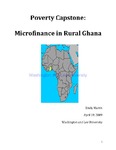Microfinance in Rural Ghana

View/
Author
Martin, Emily
Subject
Washington and Lee University, Shepherd Poverty Program
Ghana
Microfinance
Poverty
Rural development
Agriculture -- Economic aspects
Metadata
Show full item recordDescription
Capstone; [FULL-TEXT FREELY AVAILABLE ONLINE] Emily S. Martin is a member of the Class of 2010 of Washington and Lee University. This paper will explore microfinance in rural Ghana. First, it will begin with an overview of Ghana's overall approach to poverty reduction followed by an overview of the current poverty situation in Ghana. The next section will describe the promise for microfinance, including what the loans are used for and what benefits and outcomes microfinance produces. The fifth section will describe why credit is especially needed in the agricultural sector of the rural economy. The sixth and seventh sections will explain the current services available in rural Ghana and the inadequacy of the current services. The eight section describes obstacles to providing microfinance in rural areas as opposed to urban areas. The ninth section outlines the proposed reforms needed in Ghana to achieve the potential benefits of microfinancing. The tenth section describes the limitations of microfinancing and is followed by the conclusion. Ultimately, I will argue that access to credit is vital for the rural poor in Ghana and to reduce poverty in such areas. I will further argue that the current services are inadequate and that a combination top-down and bottom-up approach, involving the financial institutions and grassroots efforts respectively, is warranted to provide these services to the Ghanaian rural poor. [From Introduction] Emily Martin